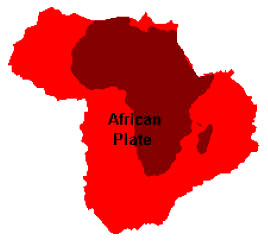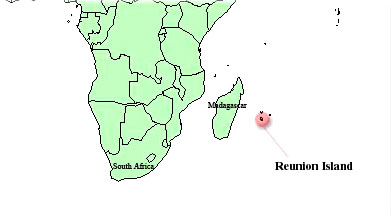|
This must be balanced by special circumstance Africa struggles with, which will become worse before they get better.
Plagues similar to the Ebola virus will spread, under the influence of the continuous rains and drizzle that run for decades after the shift, to all parts of Africa, stopped only by the seashore. The Ebola virus and its cousins live in swamps, passed among the creatures that live there, and these creatures will find all of Africa to their liking during this continuous wet season.
Where the earthquakes that devastate
cities in industrial countries will have little effect on the
primitive structures most Africans call home, crop failure will
drive survivors to eat what they can find, and these meals will
infect them. Soon all but a tiny fraction of the populace, those
with natural immunity to Ebola type viruses, will be gone.
The Canary Islands stand jutting out into the Atlantic, close to both the old and new equator and thus with a delightful climate and ocean breezes. Storms are their only concern, and storms will be their undoing during the pole shift. With ocean water on all sides, and nothing to break the wind, they will be subject to over-wash from massive ocean waves colliding as water moves both to and from the poles, and into and out of the Mediterranean.
Hurricane force winds likewise will batter these tiny islands full force, so seeking high points on the islands as an escape from the huge waves will only get one washed away. Would be survivors are advised to seek a home elsewhere, until long after the shift has passed. Will La Palma volcano in the Canary Islands, which is already damaged, experience an earthquake and fall into the sea prior to the pole shift and thereby cause a huge tsunami?
It has long been postulated that the
Canary Islands are fragile, and will collapse into the sea upon
another quake, creating a tsunami. This is a human theory, and
absurd. A land slide, under water, will create not a force of water
moving across the ocean, but a void causing water to fill that void.
Thus, a swirl of water, moving into the void and then out again,
would occur, locally.
Morocco will continue to be a tropical country after the shift, lying along the new equator. Africa as a continent will find itself above the new oceans after the poles have melted, in the main, being on remarkably high ground throughout the continent.
As with all countries lying along large water pools, cautions against being along the coast when tidal waves and sloshing can occur should be considered. Morocco’s most serious danger comes not from nature but from man, as after the shift desperate survivors from Europe will try to ford over into Africa for food and land.
As that the region, today, is primarily desert,
there will be many battles over food, and pending starvation can
make those who are starving vicious as well as desperate.
Sociologically, Mauritania will suffer due to the pervading colonial attitude of corporate interests, a situation all of Africa suffers under. The shift will disrupt communications such that those interests, the raw force of self-service and greed, will start to rely on their own judgment, without controls. This drama of the dominant power structures attempting to stay on top of a diminishing food supply and any technological resources surviving the shift will take some years to play out fully.
In the meantime, survivors of good heart
are advised to stay away from supposedly civilized areas where such
power struggles are playing out, remaining in the countryside and
keeping a low profile so as to avoid attention. Migrants from the
Middle East or Europe may find their way into Africa, seeking a
warmer Aftertime climate or more land area as the melting poles
swallow much of Europe. All the more reason to stay out of sight and
with a low profile, to avoid possible confrontations with avaricious
travelers.
African nations lying in the path of the Atlantic Ocean as it moves from the Equator to the Poles during the week of rotation stoppage, thence back into the void created by a ripping Atlantic Rift, thence sloshing back as the land moves under the Atlantic during the hour of the shift, will find the concept of a hurricane mild to describe the wind born water that will assault their coastline.
Africa is blessed with high land, being well above sea level, so the close proximity of mountains is not a requirement for safety during this storm. Move inland, however, as far as possible to the extent of putting hundreds of miles between the coastline and would-be survivors, and stay away from river banks which will rush water dumped inland back out to the sea.
After the
shift, such coastline countries will find they are well situated for
ocean fishing, and will remain tropical in their new climate zone.
Hurricanes and monsoons develop along the Equator for a reason, this being not only the warm ocean currents but also the effect the turning Earth has on water and air along the Equator, where it is pulled outward due to centrifugal force, and curled round back to areas to the north and south of the Equator where there is less pressure. During the hour of the shift, the splitting Atlantic will create a draw, pulling the cold water from the south pole up toward the lands of Equatorial Africa which jut out creating a barrier.
The land will slide first east, while the Atlantic rips, then north somewhat as the globe tips, then south as the Pacific compresses and the Atlantic rips freely. This will cause the atmosphere, dry from the deserts inland, to rush first out into the Atlantic Ocean, where they will pick up an immense amount of moisture, being super heated from the inland deserts, thence encounter cold air coming from the north during the brief drag north, where the super-moist air will start to condense, then be driven at hurricane force over the lands jutting out into this mix, such as Ghana, where the water will dump.
In the Atlantic Ocean, likewise, the water will first be drawn toward the South Pole as rotation stops for a week, thence to pulled back into the void formed by the ripping Atlantic, causing great swirls and down drafts that will take down any hapless boats afloat. The combination of swirling water and air will create more of a deluge inland, washing all along the rivers out to sea and a quick drowning.
Survivors are advised to go well inland,
several hundred miles from the coast, to avoid such a fate.
Afterwards, due to Africa’s relatively high land and advantageous
position stretched out along the new Equator, those living near the
coast will find living temperate and ocean fishing a good source of
food.
South Africa will fare well after the pole shift, due to it’s close location to the new equator and high ground. Being relatively remote as an industrialized country, it may also fare well in retaining some of its technology, being used to relying upon itself rather than others. Some electricity will most likely be generated, and road repairs done. Imported food stuffs will stop after the shift, but with an improved climate and distance from volcanoes, some crop growing will succeed.
South Africa’s largest problem will be during the shift itself, as it lies between the Atlantic and Indian Ocean. During India’s subduction, an actual suction will occur there, drawing water. When the Atlantic widens, a similar situation will occur. During the week when rotation stops, the waters of the earth will drift toward the poles, so during the shift will have a tendency to rush to fill the gaps in the Atlantic and Indian Oceans.
Water on the move is unpredictable and
forceful, and South Africa will stick out into this maelstrom
unprotected. Those wanting to survive the shift should move well
inland and return only after water sloshing has stopped, a period of
several days, to be safe.
Cape Town will find itself caught in the flow of sociological changes as well as positioned for high drama during the shift. Being at the tip of Africa, where raging water flowing between the Atlantic and Indian Oceans will drag all boats not securely moored out to sea in a torrent, the Cape will be aghast at the power of water on the move, not seen in the memory of man.
The entire continent of Africa will continue to experience a moderate climate after the shift, and being high land will not be greatly flooded, but starvation and the quest for a better life will cause migrating peoples to arrive at the Cape, where a migration must in any case stop, being at land’s end.
Due to our prediction that new land will
pop up between the tip of South American and the tip of Africa,
quests will set forth seeking this land, in the years after the
shift. Cape Town will thus seem like the coastal cities of Europe
during the last millennium, when boats set said for the rumored
lands of the Americas.
Madagascar shares space on a high old plate with Africa, and as such will not experience unexpected adjustments in subduction or shattering during quakes. It likewise has a high elevation, and much of Madagascar will remain above water after the existing poles melt. The tropical climate it experiences today will cool slightly due to being closer to the new South Pole, India, but will still be a fertile and temperate island.
The primary problem Madagascar will experience will be assaults during the shift itself from the Indian Ocean, which will first rise slightly as the week of rotation causes water to migrate toward the pole from the equator, then receive a steady flood tide from the Pacific which will empty it’s water from the shortening Pacific into, among others, the Indian Ocean, then sudden drops as India goes under the Himalayas, and all this turmoil causing roiling waters throughout.
Thus, massive flood tides running the
water up into the highlands via tidal bore, even to washing over the
mountains to the lands on the Africa side of the island, will occur.
Many will be washed out to sea, and drown.
Due to the sudden subduction of India under the Himalayas, which will happen in a wink, drowning all in India, the waters of the Indian Ocean are subject to the following factors.
Thus, Oman can expect to have horrific sloshing at unexpected times, during the hour of the shift. At first lulled during the rotation stoppage, and perhaps lulled when Indian subducts, any on the beaches may find a horrific tidal wave washing inland as the waters adjust.
Those who would survive are advised not to become spectators of the drama, by walking along the beaches, but to remain high and well inland during the duration of the shift
Reunion Island may be a delightful habitat today, but will be a trap during the pole shift. Distanced by water from the African mainland or other sources of safety, those remaining on Reunion will find themselves roasted on the one side by exploding volcanoes and awash with foul waves as the Indian Ocean sloshes first toward the South Pole, then back, forcefully, into the chasm caused by the subducting India.
Few will live, and those that do will be filled with regrets that they remained in their island paradise, lingering too long.
|

